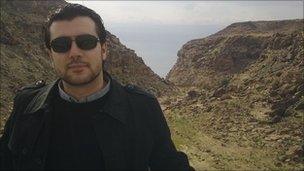Luton mosque 'challenged bomber's extreme views'
- Published

Taimour Abdulwahab al-Abdaly was married with three children
A suspected suicide bomber who detonated explosives in Stockholm was challenged about his extreme views, a Luton mosque official says.
Taimour Abdulwahab al-Abdaly, named by Swedish prosecutors as the bomber, attended Luton Islamic Centre in 2007, but "stormed out" amid criticism.
Chairman Qadeer Baksh said: "In hindsight, maybe I should have spent a bit more time with that person."
Police are searching a Luton house where Abdaly and his family lived.
Mr Baksh said he dealt with Abdaly four years ago, and that "there must have been something in between" that time and the Stockholm explosions on Saturday that influenced him.
A car, registered to Abdaly, exploded first about 1700 (1600 GMT), and then explosives attached to Abdaly detonated about 10 minutes later a few hundred yards away. Two people were injured in the second explosion.
Swedish officials described the attack as a "failure" as they believe he probably meant to detonate amongst a crowd, either at a railway station or in a department store.
Mr Baksh said it was very rare for the Luton centre, which incorporates a mosque on its premises, to expel any members.
He said when people expressed ideas which were extreme "it's a matter of dealing with them, challenging their theological basis, and making them realise this is not the Islamic point of view, and is not the way we look at life and the situation of Muslims around the world."
In all cases, they had succeeded in persuading them not to further their ideas - "except in this particular one," he said, referring to Abdaly.
"In hindsight, maybe I should have spent a bit more time with that person."
Chairman of Luton Islamic Centre, Abdul Qadeer Baksh: "I challenged him a few times"
He said that if he had believed Abdaly was dangerous, he would have notified the police.
"If a crime was committed then we should bring that information to the attention of authorities, but if no crime was committed then it's pointless.
"We have to make a very informed judgement whether we believe this person had the potential of committing a crime or putting the general public in danger, Muslims or non-Muslims."
Swedish prosecutor Tomas Lindstrand said the bomber had been carrying three different explosive devices.
"He had a bomb belt on him, he had a backpack with a bomb and he was carrying an object that has been compared to a pressure cooker. If it had all blown up at the same time, it would have been very powerful," he said.
A Swedish news agency has released an audio recording apparently made by Abdaly, in which he says oppression against Muslims in Europe will not be tolerated.
He refers to drawings of the Prophet Muhammad and to the presence of foreign soldiers - including Swedes - in Afghanistan.
Correspondents say British authorities will be examining how much time Abdaly spent in the UK and his activities.
In his profile on a dating website, Abdaly says he was born in Baghdad and moved to Sweden in 1992, before arriving in the UK in 2001 to study.
Eastern MEP Richard Howitt said the Islamic centre's actions in challenging Abdaly were correct.
"As in other terrorist cases I suspect there has been a breakdown of communication and the intelligence could have been used better, but I do believe that the right thing to do for the mosque was to chuck him out and they did it.
"It shows that he does not represent their views but I want to make sure that if anyone today in Luton knows about this man and has any information about any links or any accomplices should come forward to the police."
Gavin Shuker, MP for Luton South, said there was "good community cohesion" in Luton, but "around the edges there are always going to be problems".
He said police needed to be given time to investigate the circumstances of Abdaly's background.
"It appears on first glance that this isn't part of a much broader network... in Luton."
He added: "The mosques in Luton have a strong track record of denouncing terror, of working with other community groups - churches, the local council, the police - in looking at this problem in the round."
- Published13 December 2010
- Published13 December 2010
- Published13 December 2010
- Published12 December 2010
- Published12 December 2010